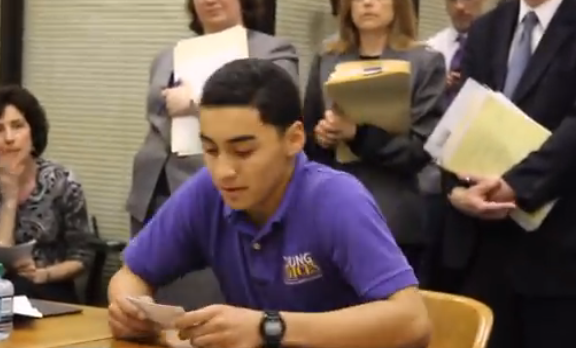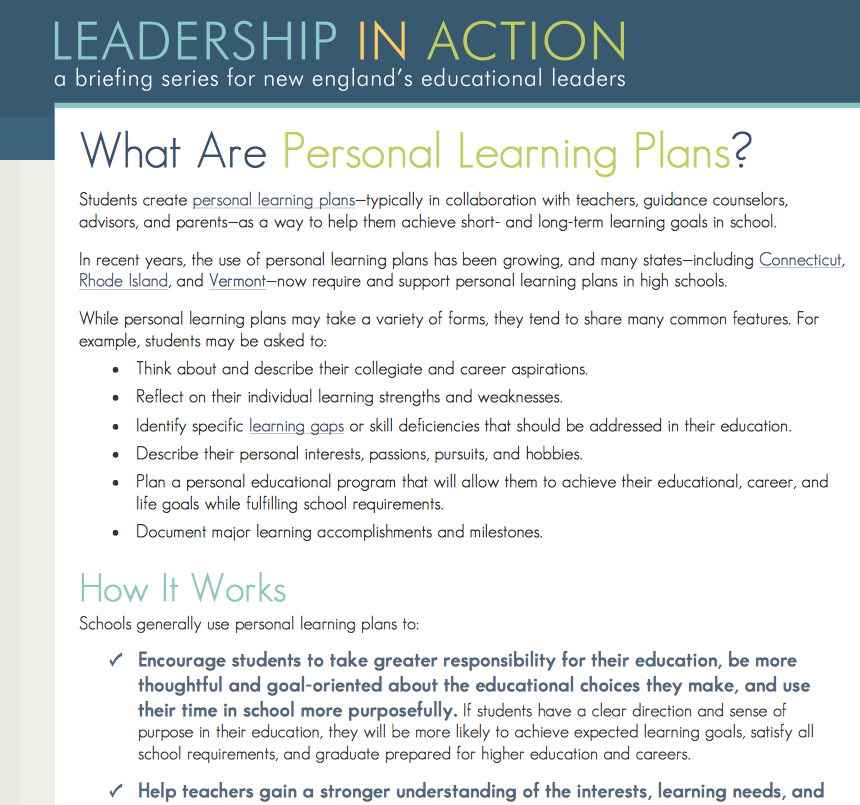Young Voices

This website works to empower low-income urban youth to become leaders in communities across Rhode Island, advocating for policy changes. At the district and local levels students conduct research, make policy recommendations, and work with school leaders to increase graduation and attendance rates. At the state-level youth have testified at hearings on state education funding… Read More ›
Leadership in Action: What Are Personal Learning Plans?

This issue brief from the New England Secondary School Consortium’s Leadership in Action series outlines what personal learning plans look like, and how schools are using them to help students achieve short and long term learning goals. Source Organization: New England Secondary School Consortium (NESSC) Visit the Resource
Personal Opportunity Plans

Personal Opportunity Plans (POPs) – an ongoing process designed to maximize a student’s academic and personal development – create a set of systems and structures for supporting students at every step along their path toward a satisfying and successful future. This paper aims to support the adoption of POPs in conjunction with districts’ and schools’… Read More ›
Aligning Competencies with the Common Core

This video from CompetencyWorks and iNACOL is a webinar about how Boston Day and Evening Academy (BDEA), a school designed to serve over-age and undercredited students, aligned their competencies to the Common Core State Standards. The video also elucidates how BDEA has fine-tuned its practices to accelerate learning for students with a wide differentiation of skills and… Read More ›
Walk in our Shoes

The Providence Student Union invited local politicians and public leaders to make the 2.96 mile walk to school necessitated by poor bus pass legislation. Source Organization: Providence Student Union VISIT THE RESOURCE
Flipped Learning Letter to Parents

Revere High School offers resources for flipped learning which includes a letter that can introduce parents to the flipped classroom approach. Revere High School implemented flipped learning during the 2013-2014 school year. Through flipped learning, teachers and students work together so that students will obtain skills needed to be prepared for college and careers of the 21st… Read More ›
Newsela

Newsela is an innovative way to build reading comprehension with nonfiction that’s always relevant: daily news. Newsela makes it easy for an entire class to read the same content, but at a level that’s just right for each student, keeps students engaged with Common Core aligned quizzes that test critical thinking and close reading, automatically… Read More ›
Student-Centered Schools: Closing the Opportunity Gap Research Brief

Student-Centered Schools: Closing the Opportunity Gap documents the practices and outcomes of four urban high schools that, through student-centered approaches, are preparing their students for success in college, career, and life by providing them with the building blocks of knowledge and skills they will need as adults. Source Organization: SCOPE VISIT THE RESOURCE
Student-Centered Learning: Life Academy of Health and Bioscience
At Life Academy of Health and Biosciences (Life Academy) in Oakland, California, student voice and choice drives every decision: what and how to teach, what structure will equip students and teachers to know and believe in each other, and how to bring out the best in students. At Life Academy, 99% of the student population… Read More ›
It Takes a Whole Society: Opening Up the Learning Landscape in the High School Years

This report calls for a creating a richer fabric of learning opportunities for youth. A much broader segment of society needs to collaborate to find the means to engage young people in meaningful learning. Nearly one-third of the four million youth who enter high school each year will drop out. The over-reliance on one institution… Read More ›
Securing the Dream

Although Latinos comprise only 8.4% of Massachusetts’ population, their age structure (tilted toward the younger age groupings) and the constant influx of new immigrants from Latin America is transforming the state’s landscape of schools and workplaces. The authors of this compilation of reports present the implications of the disparities (in education, economics, and health) for… Read More ›
The Strengths and Challenges of Community Organizing as an Education Reform Strategy: What the Research Says

In this report, the Annenberg Institute for School Reform (AISR) examines a growing body of literature on community organizing to understand how this strategy fits into systemic education reform. AISR’s research shows that community organizing for school reform has the potential to create equitable changes, develop innovative education solutions that gather insights from under-served communities,… Read More ›